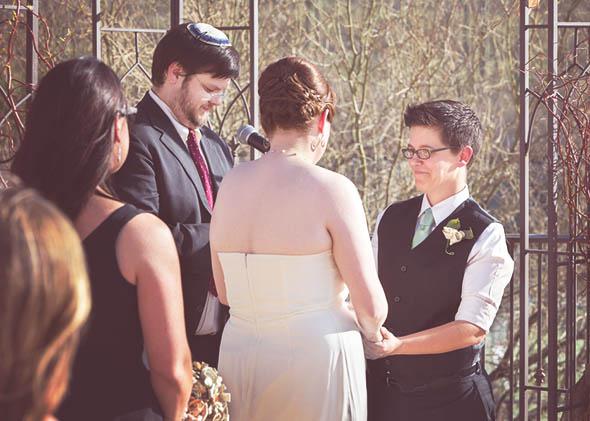JDate. JMeet. JWed. JMatch. JSingles. JZoog. JPeopleMeet. JSwipe. SawYouAtSinai. Supertova. Jewcier. JewishMatch. JewishCafe.
Evidently, the private sector has noticed that some Jewish people wish to date inside the community. But according to Rabbi Laura Janner-Klausner, all these dating websites have one major flaw.
“With JDate and other services, the assumption is that the people using it are primarily heterosexual, and everyone else is a kind of ‘plus,’ ” Janner-Klausner, the senior rabbi to the Movement for Reform Judaism in the United Kingdom, told me over the phone recently. These sites are open to gay and lesbian Jews, but in Janner-Klausner’s eyes, queer Jews are an afterthought for the entrepreneurs behind these endeavors, one category on a drop-down menu.
This is just one of the reasons why the British Reform movement has decided to launch a new service in which rabbis and cantors will act as matchmakers for same-sex, as well as opposite-sex, couples. “What’s different is that this will be a gender-neutral space where we start with a value system that believes in the complete equality of all sexualities and of all people,” Janner-Klausner said.
On one level, what the Reform movement is proposing to do is curiously old-fashioned. After all, dating websites essentially reduce the process of finding a partner to a series of algorithms, fashioning matches and likability percentages based on shared interests and personality attributes determined by responses to hypothetical moral conundrums. It’s a very precise way of doing things, and it can be successful, but it can also appear to be quite cold, impersonal, and detached.
Despite its technological trappings, the Reform movement’s plan is to revive an ancient art and drag Yente the Matchmaker into the 21st century. “As rabbis, particularly communal rabbis, people come to us and say: ‘I really would love to meet someone Jewish. Could you think of someone who you know?’ The idea is that rabbis and clergy will meet with people, and the website will be a conduit” to make that happen, Janner-Klausner explained. “If we got to matchmake two people, that’d be brilliant.”
But if the method is a little pre-modern, the service itself is rather radical. After all, JDate and the like are commercial services that exist to fulfill a certain need. The Reform movement’s proposal is noteworthy not only because of its inclusivity but also because it is coming from a religious place. An entity within Judaism is trying to solve a problem experienced by part of the gay community.
To be a gay Jew is to be a minority twice over in more than one sense. It means experiencing the marginalization that comes from being a member of two minority communities (particularly in the United Kingdom, where Jews constitute less than 0.5 percent of the population), but it is also to feel the effects of the varying degrees of acceptance toward homosexuality within a religious community.
In Britain, the positions the various streams of Judaism have taken on same-sex marriage are indicative of the spectrum of experiences the LGBTQ Jewish community has with religion. Liberal Judaism (which, in a manner of speaking, is to the left of Reform) was fully supportive of same-sex marriage even before it was legal, performing its first (unrecognized) same-sex marriage in 2005. More broadly, Liberal Judaism stands opposed to the idea that Jewish law—mainly passages from Leviticus—could be used to “stigmatize the relationships of lesbian and gay Jews.” “We affirm the right of gay men and lesbians to live as the people God created them to be,” Rabbi Roderick Young states in Liberal Judaism’s policy paper on lesbian, gay, and bisexual Jews and same-sex relationships.
Reform, not being as much of a political or ideological movement as Liberal Judaism but nonetheless an open one, came out in support of same-sex marriage in 2012. At the end of 2014, Masorti Judaism (the British sister movement of American Conservative Judaism) announced it would allow its synagogues to hold shutavut partnership ceremonies for gay and lesbian couples, which are egalitarian but distinct from the traditional marriage ceremony (in which the man takes “ownership” of the woman, for example).
The Liberal, Reform, and Masorti approaches to same-sex relationships, then, represent degrees of progressive thought, some more oriented toward tradition than others and all accepting of nontraditional relationships and families. The same cannot be said for Orthodox and ultra-Orthodox Judaism in the United Kingdom, since both steadfastly refuse to hold gay marriages in their synagogues. Their position was made clear during the British government’s consultation on same-sex marriage back in 2012, when then-Chief Rabbi Jonathan Sacks responded:
While Judaism teaches respect for others and condemns all types of discrimination, we oppose a change to the definition of marriage that includes same-sex relationships. Jewish (Biblical) Law prohibits the practice of homosexuality. It therefore follows that same-sex unions are against Jewish Law.
Gay Orthodox British Jews have written about what they feel is their exclusion from religion. The Orthodox emphasis on family and congregation “make being part of a religious community such as mine so fantastic. However, the downside is the hermeneutic usages of the biblical text that attacks same-sex acts,” Oliver Kasin wrote in Britain’s Pink News. “Sadly, the conclusion I have reached is that while same-sex marriage and homosexuality have no place in Orthodox Jewish life, then Orthodox Judaism has no place in mine.”
“It says that we are outward-facing,” Janner-Klausner told me when I asked what she thinks this new dating service says about the Reform movement. “We’re interested in Jewish continuity, and we also believe deeply in equality and in the power of clergy to connect up with our congregants. It means we’re being pro-active to people’s needs.”
